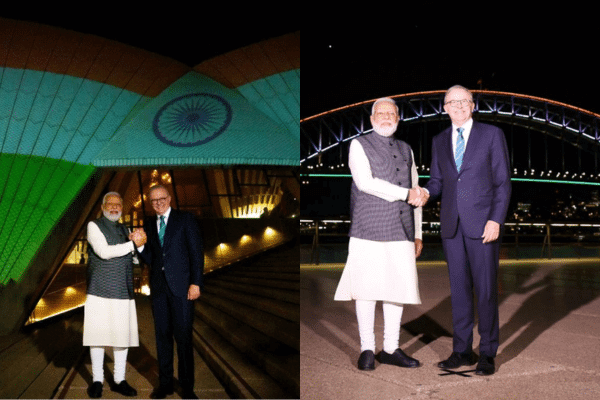After their sixth meeting in one year, Prime Ministers Narendra Modi and Anthony Albanese have demonstrated that the two nations have strengthened their relationship to mutual benefit.
“This is a relationship we need to invest in,” PM Albanese said during PM Modi’s visit. “Our strong partnership with India will deliver benefits for Australia in trade, investment and business, and in regional security and stability.”
Mr Modi agreed. “In the language of cricket, our ties have entered the T-20 mode.”
He added, “Our democratic values are the foundation of our ties. Our relations are based on mutual trust and respect.”
For the diaspora waiting for Mr Modi to visit, the main event was a large community gathering at which both prime ministers attended alongside some 20,000 Indian-Australians. The Qudos Bank Arena event organised by the Indian Australian Diaspora Foundation made headlines across both nations. The sheer energy at the event saw Mr Modi later describe the diaspora as “both a bridge and the beating heart of the (India-Australia) relationship”.

In more formal settings, a slew of new measures were announced in the bilateral relationship.
Increased diplomatic presence: Australia will open a new Consulate in Bengaluru this month, its fifth diplomatic presence in India after New Delhi, Mumbai, Chennai, and Kolkata. India has just announced its own fifth diplomatic presence in Australia, this time in Brisbane, following Sydney, Canberra, Melbourne and Perth.
The Australia-India Migration and Mobility Partnership Agreement was signed. This will promote the exchange of students, graduates, researchers and business people; expand people-to-people ties and enhance cooperation in preventing people smuggling.
The Australia-India Green Hydrogen Taskforce was established to expand the cooperation on the global clean energy transition. This will comprise Australian and Indian experts in renewable hydrogen and report to the Australian-Indian Ministerial Energy Dialogue on the opportunities for the two nations to cooperate in the area of renewable hydrogen. “Investments like the taskforce will help power our industries in the future, and ensure that Australia and India meet our energy targets in the interests of both our respective countries, but also in support of reduction of global emissions,” Mr Albanese said.
At a business roundtable in Sydney organised by the Australia Trade and Investment Commission (Austrade) and the Indian High Commission, PM Modi met with top Australian CEOs. “We elaborated on the business opportunities in India and the reform trajectory of our Government, and invited Australian businesses to invest in India,” Mr Modi noted. The fields of interest mentioned were infrastructure including digital infrastructure, IT, telecom, semiconductors, fintech, renewable energy including green hydrogen, space, education, pharma, healthcare including medical devices manufacturing, mining including critical minerals, textiles. Agriculture and food processing.
Among the corporate leaders who met with PM Modi were Swati Dave (CAIR), Sanjeev Gandhi (Orica), and Jennifer Westacott (Business Council of Australia), Catriona Jackson (Universities Australia), Matt Comyn (CBA), and Prof Mark Scott AO (USyd).

Mr Modi also met with Gov Gen David Hurley and Leader of the Opposition Peter Dutton.

Prime Minister Albanese and Foreign Minister Penny Wong announced that the new Centre for Australia-India Relations CAIR will be head-quartered in Parramatta. The Centre, which began operations this month, aims to drive deeper engagement with India through business, policy and cultural activities and work with Indian diaspora communities.
The Centre is led by Chair Swati Dave and CEO Tim Thomas. The inaugural Advisory Board for CAIR was also announced, and includes Florence Drummond (CEO, Indigenous Women in Mining and Resources Australia), Adam Gilchrist AO (former Australian cricket captain), Amrit Gill, (Creative Program Lead, City of Melbourne), Catriona Jackson (CEO, Universities Australia), Sammy Kumar (CEO, Sayers Group), the Hon. Martin Hamilton-Smith (former South Australian Minister for Trade), Mitu Bhowmick Lange AM, (CEO, Mind Blowing Films), Jodi McKay (National Chair, Australia India Business Council), Gunjan Pagare (Executive Manager, Community Investment, Commonwealth Bank), Amit Singh (Managing Partner, Mandala Partners), and Jan Adams AO PSM ex-officio (Secretary, DFAT).
The Indian PM met one-on-one with a select bunch of public figures from a variety of fields, including Toby Walsh, singer Guy Sebastian, scientist and Nobel Laureate Dr Brian Paul Schmidt of the ANU, sociologist Prof. Salvatore Babones of USyd, ‘toilet warrior’ Mark Balla whose social enterprise builds toilets for girls, celebrity chef Sarah Todd, First Nations artist Danielle Mate, Gina Rinehart (executive chairman of Hancock Prospecting), Paul Schroder (CEO Australian Super), and Dr Andrew Forrest (executive chairman of Fortescue Future).

Prime Ministers Albanese and Modi revisited the issue of the attack on temples in Australia and activities of separatist elements. “We will not accept any elements that harm the friendly and warm ties between India and Australia by their actions or thoughts,” Mr Modi said. “I thank Prime Minister for the actions that have already been taken. Prime Minister Albanese has once again assured me today that he will take strict actions against such elements in the future also.”

At the end of his visit, Mr Modi said he looked forward to meeting his Australian counterpart again shortly, at the G20 summit in September. He also had a much broader invitation:
“I invite Prime Minister Albanese and all Australian cricket fans to India for the Cricket World Cup this year. At that time, you will also get to see the grand celebrations of Diwali in India.”
READ ALSO: Sameer Pandey is the new Lord Mayor of Parramatta




